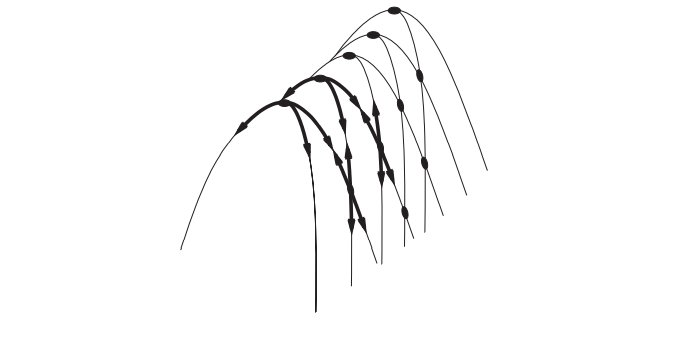Hill-climbing search is simply a loop that continually moves in the direction of increasing value—that is, uphill. It terminates when it reaches a “peak” where no neighbor has a higher value. The algorithm does not maintain a search tree, so the data structure for the current node need only record the state and the value of the objective function. Hill climbing does not look ahead beyond the immediate neighbors of the current state. This resembles trying to find the top of Mount Everest in a thick fog while suffering from amnesia
Hill climbing is sometimes called greedy local search because it grabs a good neighbor state without thinking ahead about where to go next. Although greed is considered one of the seven deadly sins, it turns out that greedy algorithms often perform quite well. Hill climbing often makes rapid progress toward a solution because it is usually quite easy to improve a bad state

Hill climbing search implementation using Python
import math
increment = 0.1
startingPoint = [1, 1]
point1 = [1,5]
point2 = [6,4]
point3 = [5,2]
point4 = [2,1]
def distance(x1, y1, x2, y2):
dist = math.pow(x2-x1, 2) + math.pow(y2-y1, 2)
return dist
def sumOfDistances(x1, y1, px1, py1, px2, py2, px3, py3, px4, py4):
d1 = distance(x1, y1, px1, py1)
d2 = distance(x1, y1, px2, py2)
d3 = distance(x1, y1, px3, py3)
d4 = distance(x1, y1, px4, py4)
return d1 + d2 + d3 + d4
def newDistance(x1, y1, point1, point2, point3, point4):
d1 = [x1, y1]
d1temp = sumOfDistances(x1, y1, point1[0],point1[1], point2[0],point2[1],
point3[0],point3[1], point4[0],point4[1] )
d1.append(d1temp)
return d1
minDistance = sumOfDistances(startingPoint[0], startingPoint[1], point1[0],point1[1], point2[0],point2[1],
point3[0],point3[1], point4[0],point4[1] )
flag = True
def newPoints(minimum, d1, d2, d3, d4):
if d1[2] == minimum:
return [d1[0], d1[1]]
elif d2[2] == minimum:
return [d2[0], d2[1]]
elif d3[2] == minimum:
return [d3[0], d3[1]]
elif d4[2] == minimum:
return [d4[0], d4[1]]
i = 1
while flag:
d1 = newDistance(startingPoint[0]+increment, startingPoint[1], point1, point2, point3, point4)
d2 = newDistance(startingPoint[0]-increment, startingPoint[1], point1, point2, point3, point4)
d3 = newDistance(startingPoint[0], startingPoint[1]+increment, point1, point2, point3, point4)
d4 = newDistance(startingPoint[0], startingPoint[1]-increment, point1, point2, point3, point4)
print i,' ', round(startingPoint[0], 2), round(startingPoint[1], 2)
minimum = min(d1[2], d2[2], d3[2], d4[2])
if minimum < minDistance:
startingPoint = newPoints(minimum, d1, d2, d3, d4)
minDistance = minimum
#print i,' ', round(startingPoint[0], 2), round(startingPoint[1], 2)
i+=1
else:
flag = False
